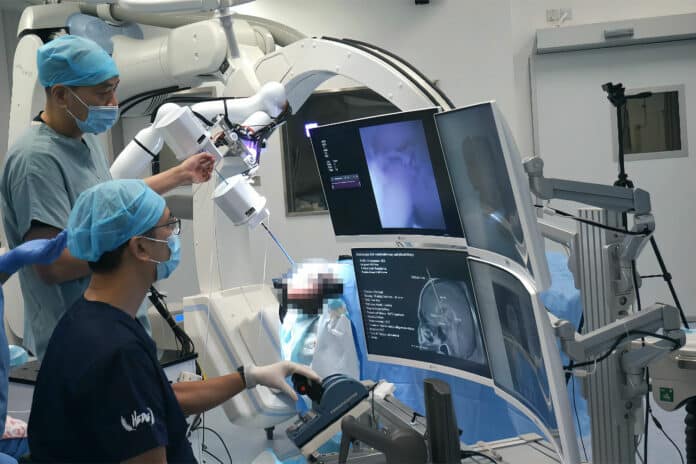Existing techniques for neurosurgery mainly involve a rigid endoscope or microscope to reach the location of the surgical site. To artificially create a linear surgical track, a large bone window must be created on the skull, and healthy brain tissues must be retracted.
This surgical method needs two surgeons and usually requires two invasive penetration trajectories to the cortex. This method can damage the brain and increase the possibility of surgical complications.
Hong Kong-based Centre for Artificial Intelligence and Robotics (CAIR) researchers have developed, MicroNeuro. It is the world’s first flexible robotic system that relies on artificial intelligence for minimally invasive neurosurgery.
The flexible robotic system is integrated with the technologies such as flexible endoscopy, precision control, and AI to address the challenges introduced by the fragile brain tissue, small space, and difficulty in surgical manipulation, breaking the limit of human hand-eye-brain capability.
MicroNeuro reaches the targeted location through the natural brain cavities in the least invasive manner using preoperative planning based on MRI images. It uses a flexible endoscope that allows extra safety and enables nonlinear surgical trajectory.
Using the flexible robotic system, a single surgeon can complete all the required surgical tasks through one skull hole with one trajectory, thus reducing brain tissue damage by at least 50% and leading to fewer surgical complications.
The flexible robotic system can be used to perform deep-seated intracranial surgeries, such as ventricle surgeries, decompression for trigeminal neuralgia, cerebral hemorrhage, and minimally invasively, including cerebral hemorrhage decompression for trigeminal neuralgia, helping millions of patients to relieve pain and save lives.
MicroNeuro has conducted several cadaver trials of endoscopic third ventriculostomy and pineal biopsy to treat pineal region germ cell tumors.
The main aim of the MicroNeuro team is to develop a fully sensorized and AI-enabled minimally invasive surgical flexible robot for neurosurgery. The main goal of the research is to digitize surgery and realize standardized treatments to let high-quality medical services benefit more patients worldwide.
